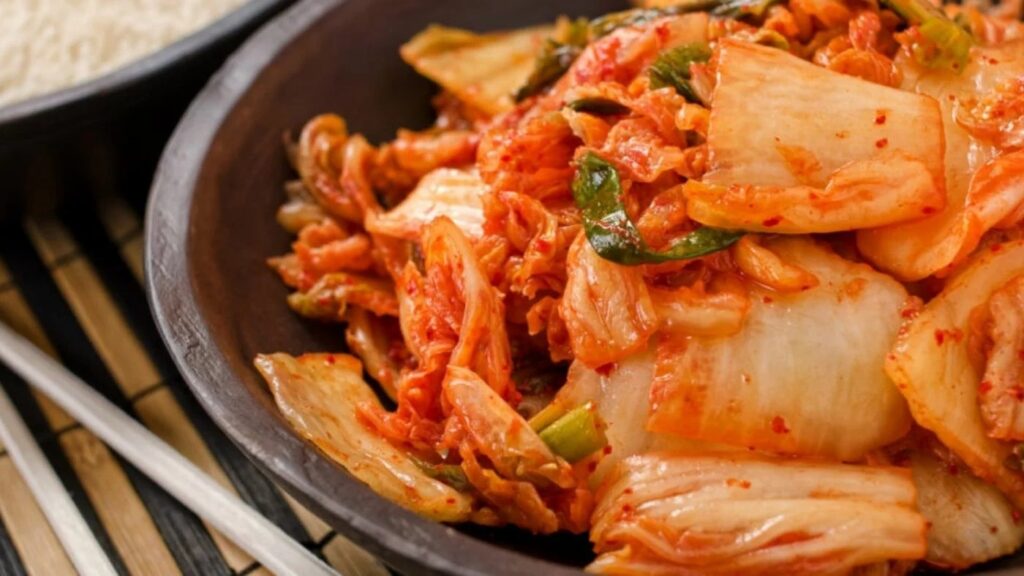Find out why science says kimchi is good for you! In this article, you’ll learn about the health benefits of kimchi, its richness in nutrients, its digestive properties, and more.
Kimchi is a slightly spicy, crunchy, and tasty Korean sauerkraut. Kimchi is consumed with every meal in Korea, both for its good taste and its health benefits.
Traditional kimchi contains napa cabbage, carrots, daikon radish, ginger, garlic, and chili. These ingredients are then salted and lacto-fermented, giving the kimchi a nice tangy flavour.
More than just a vegetable mixture, kimchi has many health benefits.
In a nutshell, kimchi is rich in nutrients, promotes the gut microbiota, contains many antioxidants, and could help fight heart and chronic diseases.
Read on to discover the scientifically proven benefits of kimchi!
Kimchi Is Rich in Nutrients and Vitamins
Like all salt-based fermentation, kimchi is traditionally prepared in Korea to preserve vegetables throughout the winter. Thanks to lacto-fermentation, the freshness and nutrients of the vegetables are preserved all year round!
Kimchi is made from a wide variety of fresh, raw vegetables. It also contains nutritious foods that each have their own benefits, such as garlic, ginger, and chili.
Moreover, fermentation preserves the nutrients in the vegetables, and creates new ones! Kimchi contains among other things vitamins C, beta-carotene, and vitamin B. It is also a good source of various essential minerals (calcium, potassium, iron, etc.) (ref.)
Fermentation also transforms the nutrients in vegetables into a form that is more easily assimilated by our bodies. It also consumes some of the sugars in the vegetables, making kimchi a nutrient-dense, low-calorie food.
Kimchi Supports Gut Health and the Microbiota
Are you familiar with the microbiota?
This concept refers to all the microorganisms that live with us in symbiosis. They help us to digest food and absorb its nutrients. The microbiota also plays a role in our immune system.
Eating kimchi could help support our microbiota, as it is a prebiotic and probiotic food.
Prebiotic
Prebiotics are foods that nourish and support the microorganisms that live in our gut.
Kimchi contains a lot of dietary fibre (ref.) that bacteria in our digestive system love. They can therefore multiply and contribute to the proper functioning of the microbiota.
Fibre in kimchi is also pre-digested by the bacteria, and therefore easier for us to digest. Fermented cabbage is much more digestible than raw cabbage!
Probiotic
Kimchi is a living food! When eaten raw, it contains billions of good probiotic bacteria. (ref.)
These bacteria can join those of our microbiota and help it perform its protective functions.

Kimchi Contains Antioxidants
In addition to containing all kinds of good bacteria, kimchi also contains many antioxidants! Although raw vegetables are full of antioxidants, fermented kimchi contains even more.
A study has shown that the longer kimchi is fermented, the more antioxidants it contains. Fermentation creates new antioxidant molecules! (ref.)
These molecules neutralize the free radicals in our body that can damage our cells. (ref.)
Regular consumption of antioxidants may reduce chronic inflammation, slow the aging of our cells, and help prevent certain cancers. (ref.) In addition, antioxidants consumed as food are often more effective than supplements. (ref.)
One more reason to put kimchi on the menu!
Kimchi May Be Good for Your Heart
Kimchi has earned a place in our hearts, but it could also help them! Many studies are currently looking at the links between kimchi consumption and heart health.
One study found that regular consumption of kimchi can help reduce blood sugar, total cholesterol, and bad cholesterol, all of which are risk factors for heart disease. (ref.)
Its beneficial effect may also be due to its anti-inflammatory effects. Indeed, chronic inflammation is currently being studied as a potential source of heart problems. (ref.)
Kimchi May Help With Healthy Weight Management
Kimchi is first and foremost a delicious serving of vegetables! Kimchi is naturally rich in nutrients, high in fibre, and low in calories.
Kimchi also has the advantage of being fermented: during fermentation, bacteria consume the carbohydrates and release new nutrients. It is a better vegetable, with fewer calories!
In addition, studies have looked at the effect of kimchi on blood sugar. Consumption of fermented kimchi has been shown to help pre-diabetic subjects better manage their blood sugar levels and reduce their poor insulin resistance. (ref.)
Regular consumption of kimchi has also been found to help obese patients improve their blood pressure and lose weight. (ref.) Several animal studies also show a reduction in body mass with a diet rich in kimchi. (ref.)
Are There Any Health Risks Associated With Kimchi?
Kimchi is a safe food to eat and prepare at home.
It is prepared through a fermentation process, which is very safe. Its acidity protects it from harmful bacteria, such as botulism and E. coli.
In fact, one study showed that E. coli bacteria disappeared during the fermentation of kimchi! The acidity, salt, and good lactic acid bacteria protect the kimchi from contamination (ref.).
It should be noted that kimchi is a food that contains salt. It may not be suitable for some people who monitor salt in their diet. However, kimchi is not associated with a greater risk of high blood pressure. (ref.)
Finally, like most fermented foods, kimchi also contains histamines. It is therefore not recommended to consume kimchi if you have histamine intolerance (1 to 3% of the population – ref.).

How to Make Kimchi at Home
As well as being full of goodness, kimchi is easy to make at home.
All you need are vegetables, salt, a jar… and a little patience!
Making Kimchi in 5 Steps:
- Chop the vegetables (cabbage, carrots, daikon, etc.)
- Mix the vegetables with salt and herbs
- Put in a jar
- Let them ferment for a few days at room temperature
- Taste!
Kimchi can be eaten with meals, rice, eggs, sandwiches, soups, etc.
For more information, see our traditional kimchi recipe or our quick kimchi recipe.

